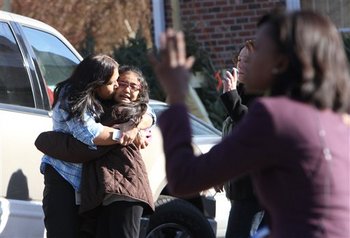As the horrific details in the Connecticut school shooting continued to come out Friday, a University of Michigan psychologist advised parents to have appropriate conversations about the day's events with children.
Officials report 27 people are dead, including 20 children, after an armed man entered Sandy Hook Elementary School about 9:30 a.m. Friday in Newtown, Conn. The school's principal and psychologist were among those killed. The shooter's mother, who is a teacher at the school, was found dead at his residence, police said. The shooter was found dead inside the school.

A woman hugs her daughter after they were reunited at the Sandy Hook firehouse following a mass shooting at the Sandy Hook Elementary School, Friday in Newtown, Conn. A grief counselor said it's important for parents to reassure their children that they're safe.
Frank Becerra Jr. | The Journal News/AP Photo
Kaplow advises that parents tailor conversations to the child’s age and knowledge of the situation.
The worst response to a child’s questions about the shooting would be for a parent to say the child was not allowed back at school again, Kaplow said. Other bad responses include shutting down when a child asks questions, or telling a child that the world is a scary, awful place, Kaplow said.
What parents say to their children is not as important as their behavior and making their child feel comfortable and safe talking about it, Kaplow said.
For very young, kindergarten-age children, Kaplow advised only bringing up the event if the child exhibits signs of being upset as a direct result of the shooting.

Julie Kaplow
“The best approach is to ask questions: Did they hear about any news reports today?” Kaplow said.
Parents need to make sure the information about the shooting comes from them and not from another child.
Find out what a child knows about the situation first, Kaplow said.
“For very young children, say ‘That’s right, a scary thing did happen, but I’m here to keep you safe,’” Kaplow said.
Kaplow said children may ask questions about death and fears about dying, given the shooter in Connecticut allegedly killed a number of children in the school.
“It depends on the individual child. If you have a very curious child, who is reading things and knows things, it is useful and important to talk about the circumstances in which this happened,” Kaplow said.
If a child is relaying factually incorrect information that adds to his or her fear of the situation, it’s also a time when parents need to correct what they know, Kaplow said.
Parents should avoid describing concrete details of the event to young children, and shelter them from learning too much about the event from the media.
“Provide reassurance that we’re doing everything we can to keep you safe in your school,” Kaplow said.
Children need to hear that it’s a rare occurrence, that they’re safe and that the adults at their school take every precaution to keep them safe, Kaplow said.
“We know that parents who can show warmth and affection and give hugs, and encourage children to talk about their feelings those kids are going to be the most resilient and get through the situation the best,” Kaplow said. “Making good eye contact, responding in an engaged way.”
Older children in middle school and high school may need specific concrete details about the event, and it’s good to talk about them. Dealing with the tragedy may require more than one conversation, even weeks from now, Kaplow said.
For parents dealing with the stressful situation, Kaplow recommended they make sure to take care of themselves and seek help if they feel truly overwhelmed by what happened.
“I would encourage parents to openly discuss these concerns or worries with the leadership of their individual schools,” Kaplow said.
Amy Biolchini covers Washtenaw County, health and environmental issues for AnnArbor.com. Reach her at (734) 623-2552, amybiolchini@annarbor.com or on Twitter.